Amy Burek on her publishing project Awkward Ladies Club, zine-making, and the joys of internet forums
Burek has made zines about Wikipedia list pages, internet parenting advice, LiveJournal entries, and Craigslist dating ads.
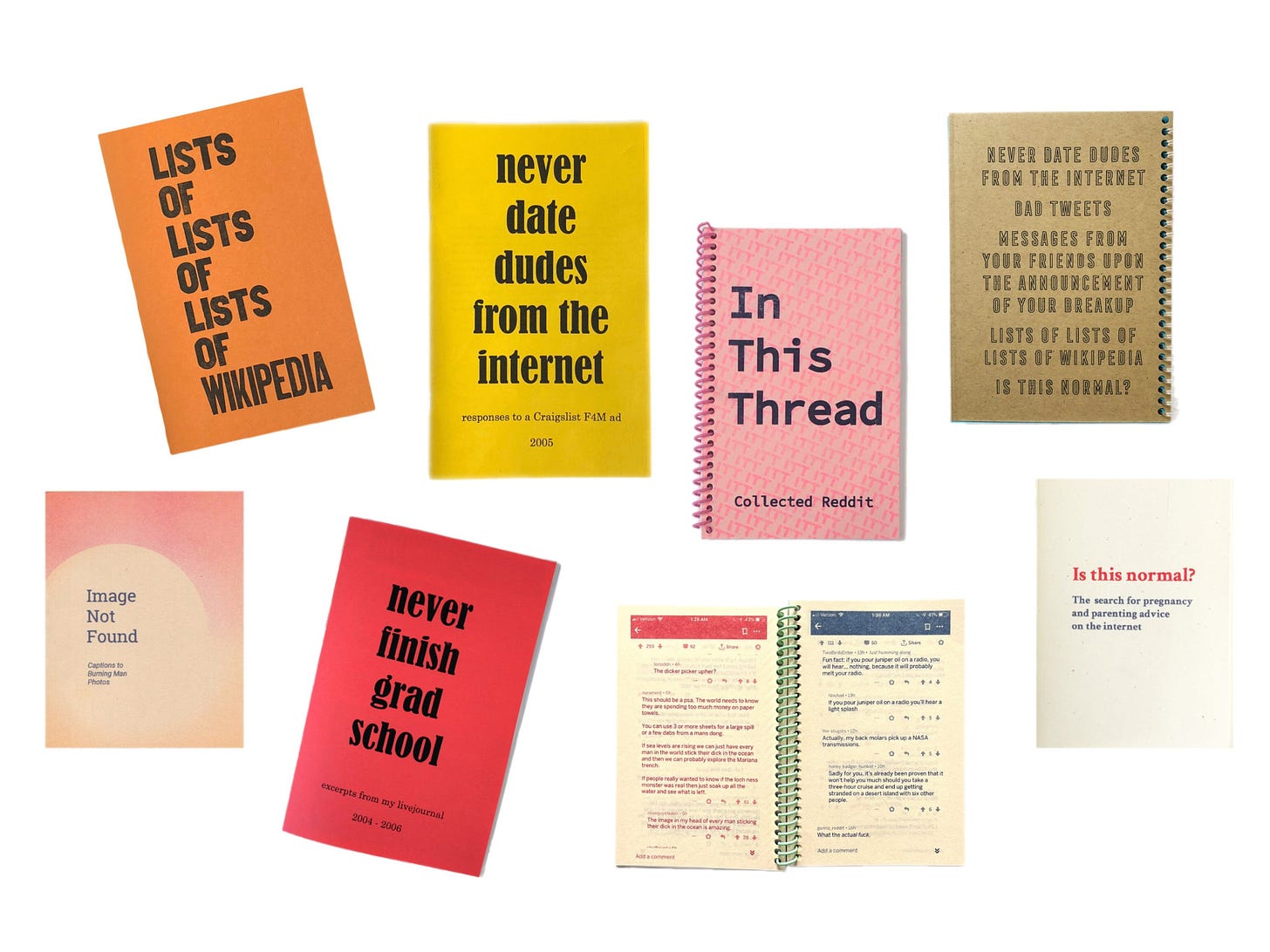
Amy Burek is a scientist, artist, and the creator of the publishing project Awkward Ladies Club. She’s also a co-founder of Chute Studio, a collaborative risograph studio in Oakland, California. I first came across Burek’s work on Etsy and was immediately drawn to her internet-themed zines—covering Reddit, Craigslist, Wikipedia, and more.
Here is our conversation about her zine-making process, the ephemerality of social media, and the joys of internet forums.
(This interview has been edited for clarity and concision. You can also find Awkward Ladies Club and Chute Studio on Instagram.)
PHONE TIME: Can you tell me a bit about how Awkward Ladies Club started?
AMY BUREK: I started reading zines in the early 2000s and went to the Alternative Press Expo multiple years in a row. I was consuming a lot of zines for a few years.
In 2012, a friend of mine and I were like, “We’ve been reading zines—we could make them too.” We got a table at that year’s San Francisco Zine Fest, and both of us were making our books right up to the wire. I finished two zines for that—"Never Date Dudes From The Internet” and “Never Finish Grad School.” It turned out that making them was just as fun as reading them.
I’d wanted to do a book about my experience in grad school. Instead of writing about it again years later, I downloaded all my old LiveJournal entries.
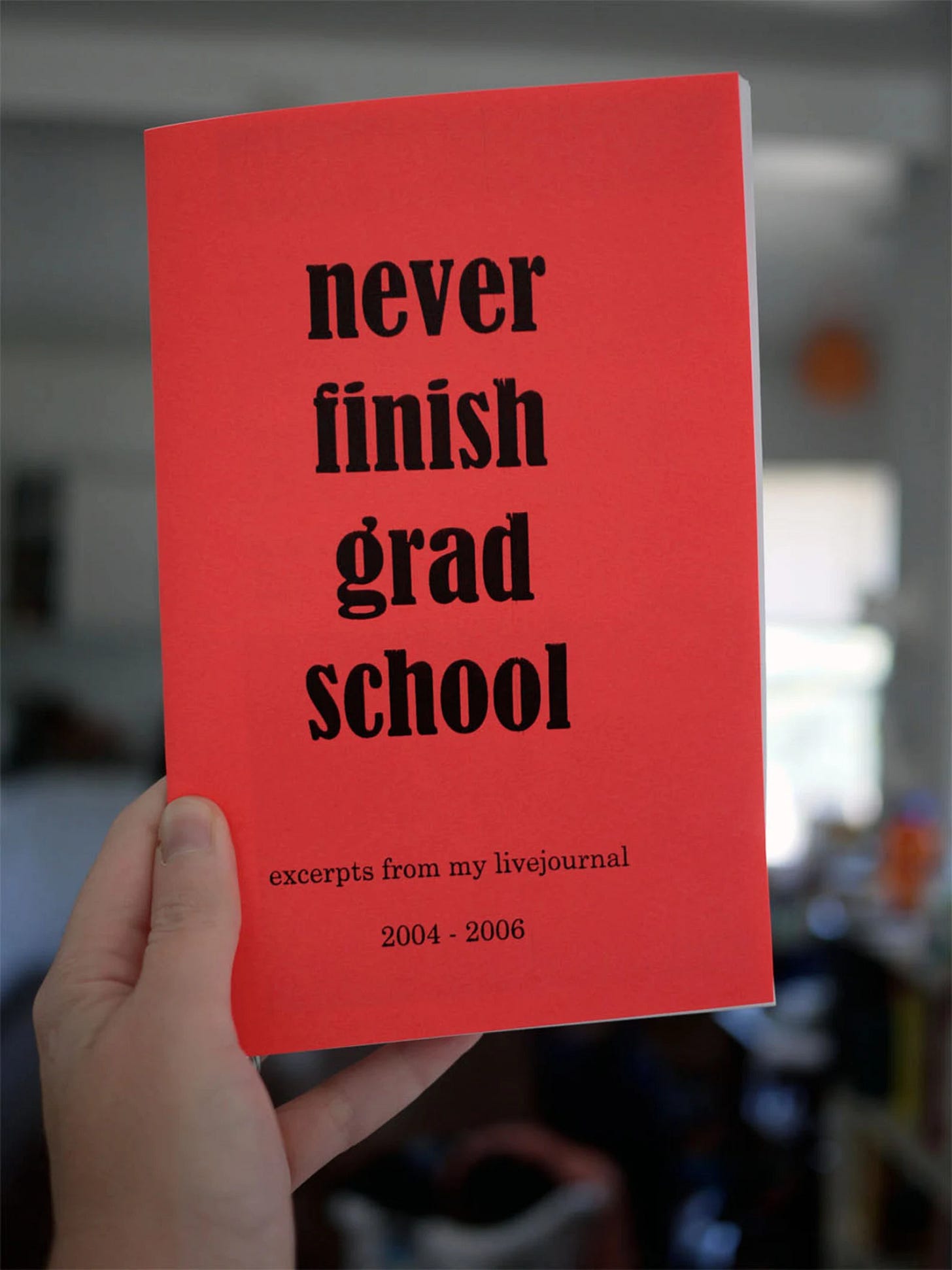
I kind of hit a wall finishing that zine. I was going through an old email account, and I had left a folder called “Craigslist.” I thought it was from when I was apartment hunting, but it turned out I’d saved all these responses from a Craigslist dating ad I’d posted. When I read through those, I was like, “Oh, wow—this is a lot funnier now than it was seven years ago.”
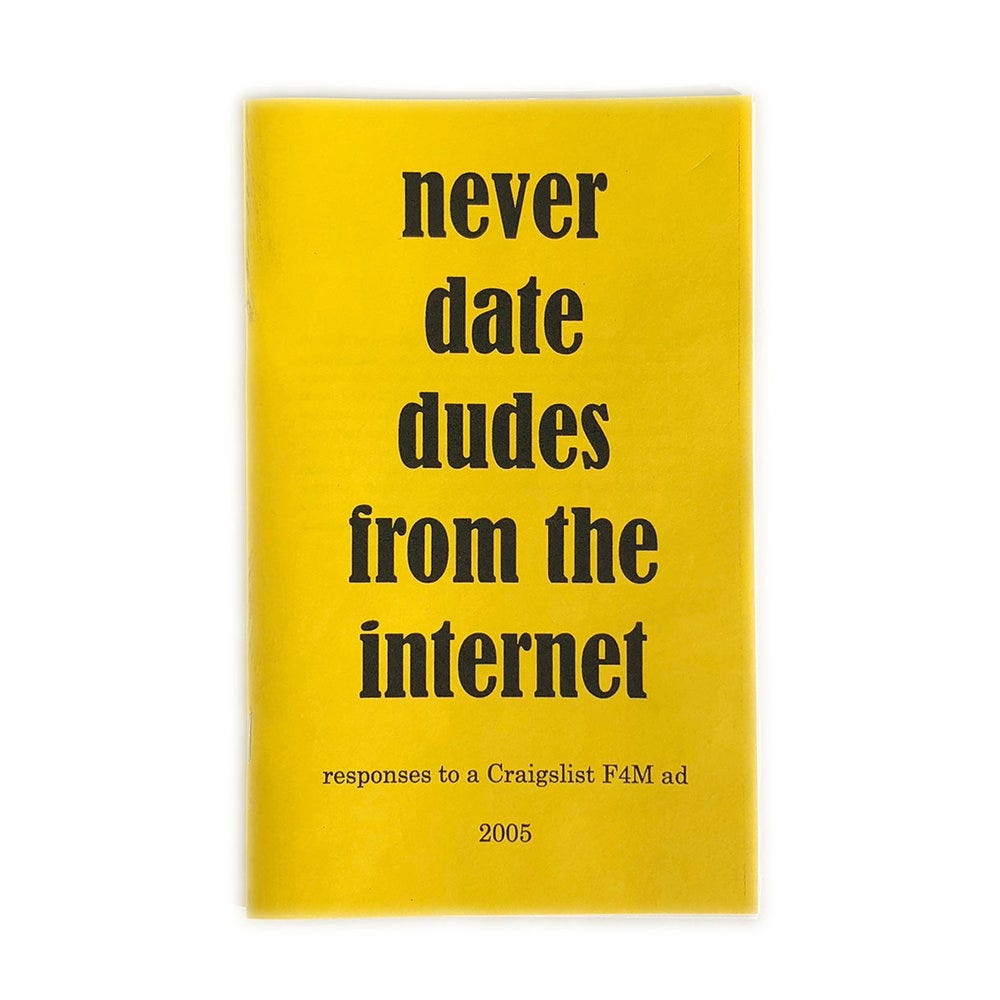
People really respond to the books about the internet. They’re fun, and they lead to a lot of really interesting conversations. I have kept making books on that topic ever since.
PHONE TIME: What’s your process when choosing what to make a zine about? Does it just kind of come to you?
BUREK: A lot of it comes from recognizing patterns in my own internet habits. I used to spend a lot of time on Wikipedia on my phone trying to fall asleep, because you can just click a link and they’ll send you to a random article.
Over time, I realized I was bookmarking more and more lists that were kind of nonsensical. Wikipedia users seem to really like list pages, but the editors think they’re not informative enough. So people will make list pages, and then the editors will take them back down, and they go up and down, up and down.
I thought, “Oh, I should print all of these out,” because the individual pages didn’t seem long for the digital world.
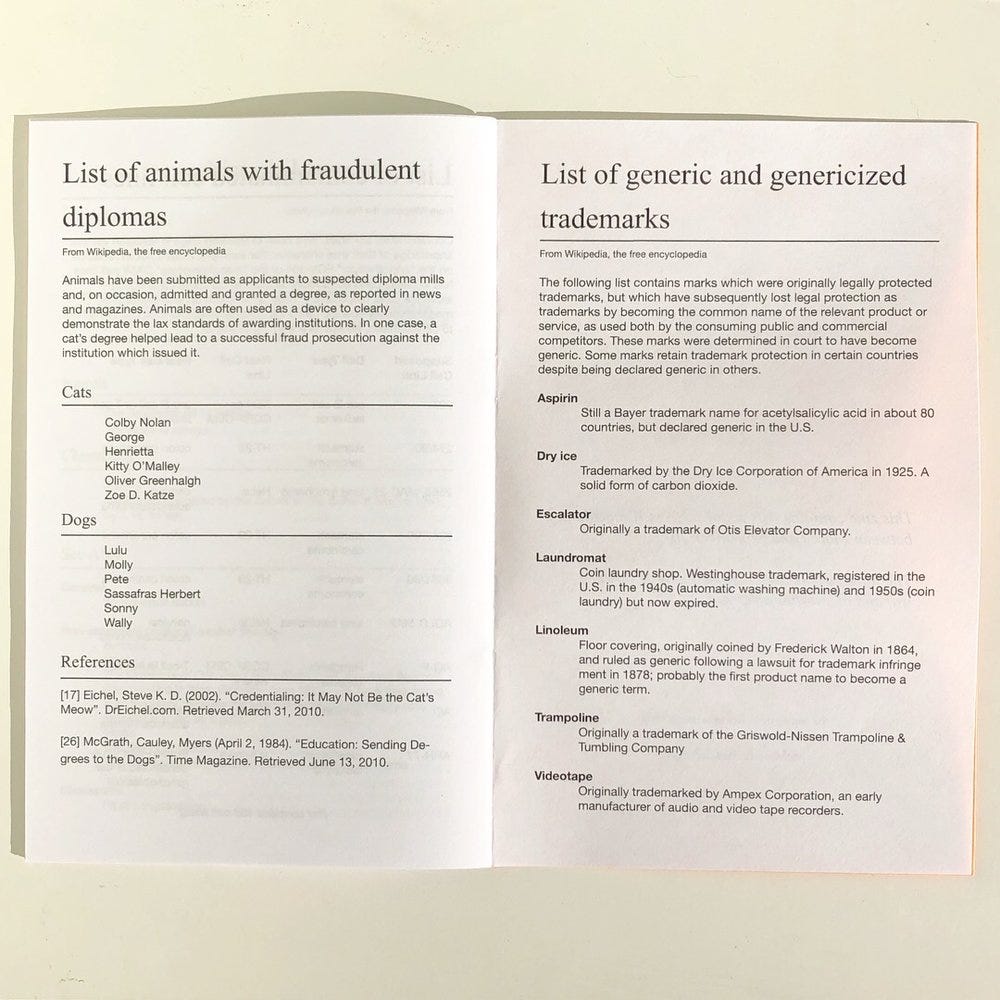
The one I made about parenting forums came from the time I was pregnant and after my son was born. I spent a lot of time on Reddit, reading some helpful things about parenting and some unhelpful things. The question that people kept asking over and over again was, “Is this normal?”
“My body feels like this—is that normal?” Or “My baby's doing this—is that normal?” The answer was almost always “Yes, it’s normal.” But every once in a while, it would be, “No, you need to immediately go to the hospital.”
Not all of it is common sense, necessarily—but some of the questions are just really out there.
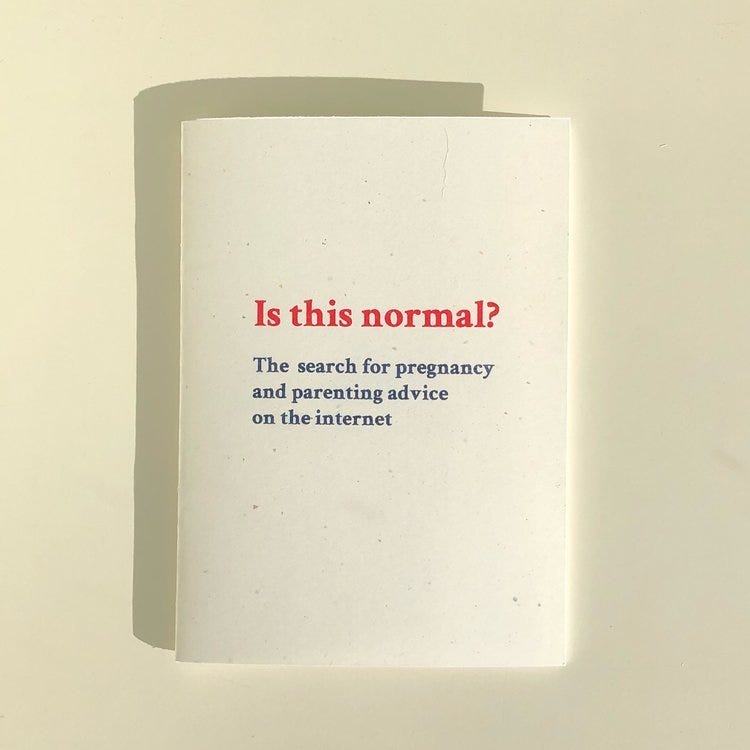
PHONE TIME: Have you seen your creative practice evolve over time, or that you’re considering different things when you’re making different pieces of art?
BUREK: My background was originally in the sciences—I worked in biotech for a number of years. When I started making art, I made a lot of it about science. Over time, I was like “Science is my old life, and whatever I’m doing now is more important.”
But over the last few years, I’ve been more interested in covering science topics. I think there’s been enough distance now that thinking about that stuff is kind of fun.
The largest non-internet project that I worked on recently was the guidebook to bacteria. It’s a similar feel—it’s a collection of things I appreciate, and I make a hard copy and see if anyone else appreciates it.
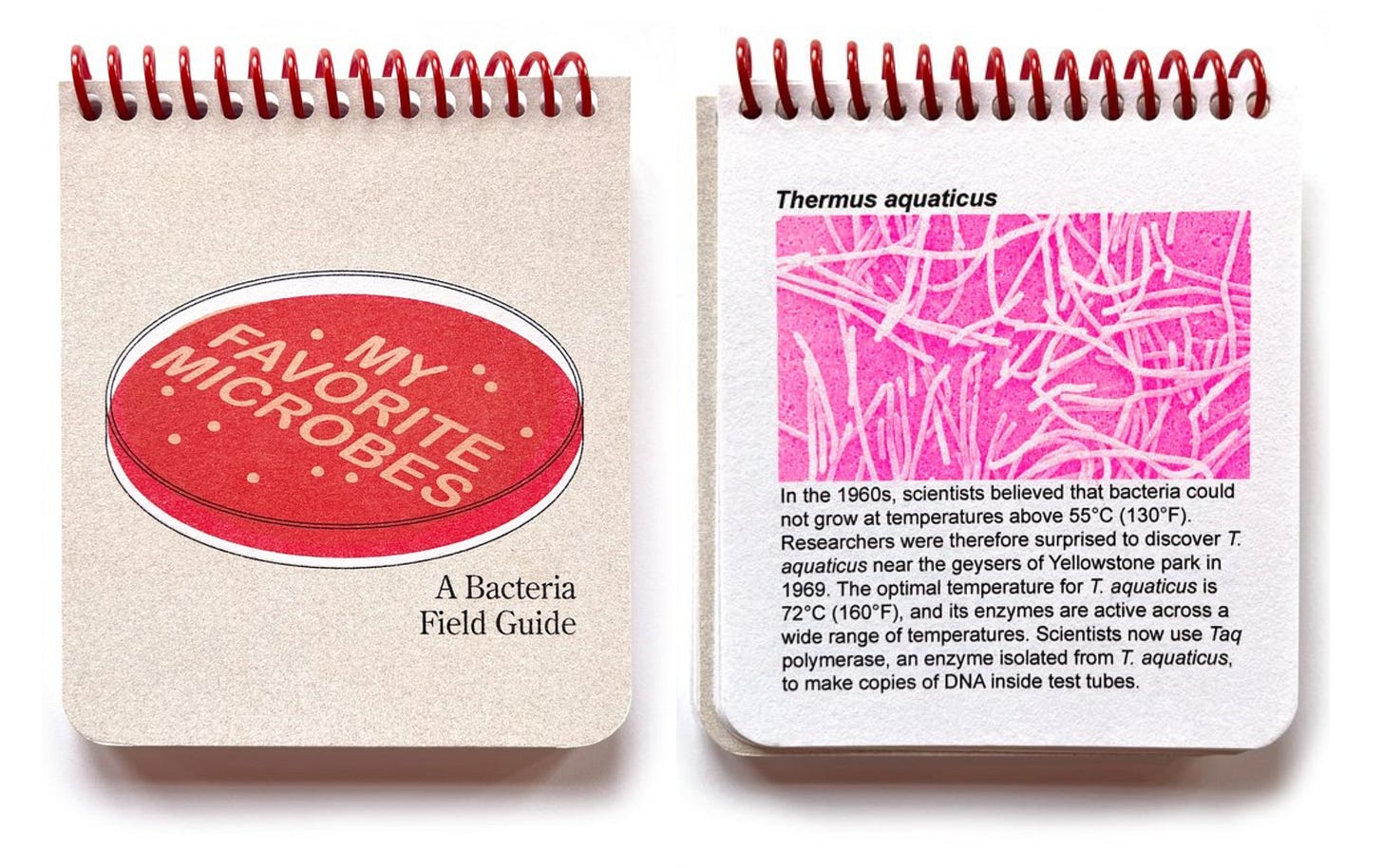
I feel like I spend less time on the internet than I used to. So when I think about doing more projects about the internet, I really want to explore some of the older things I was interested in.
I’m in my 40s now, and when I meet people in their 20s, I realize their experience of growing up is completely different. For some people, it’s a totally new experience to ask, “What was it like to date on the internet before Tinder?”
Now, with internet dating, you exchange pictures first. If you think you’ll connect, then you start writing to each other. 20 years ago, it used to be you’d write your own personal ad and talk to someone over email for a while. If you thought you were hitting it off, then you’d share pictures. It’s interesting how that has completely turned over.
PHONE TIME: Why do you think people are resonating so much with zines about the internet and different forums?
BUREK: I feel like the internet has been getting less fun in the past few years. Your social media feeds are really ephemeral. With the infinite scroll, if you’ve put up content years ago, it can be really hard to find it again, even if it’s still up there. I think there’s growing nostalgia for the internet 1.0.
PHONE TIME: Yeah, I would even say that people from my generation are very interested in this kind of nostalgic web 1.0. My friends who are into the internet are really into that stuff, even if we didn’t experience it ourselves.
The community aspect is something your zines really touch on.
BUREK: There’s a lot of interest in people’s personal stories about the internet— there’s something comforting in knowing that people are having similar experiences to you. I think that’s part of why the internet is so cool. No matter what, there’s always someone out there who can relate to you.
Those pockets of the internet that have really withstood the test of time are the ones where real connection and community can form.
It’s a similar thing with fandom. Being really into a media franchise or a book series—the communities that pop up around that seem to have a lot of staying power.
PHONE TIME: People are really concerned—even in my generation—about preserving the internet and things that feel super ephemeral. There’s been a lot of renewed interest in zines and even printing out Instagram posts, just to archive them physically.
BUREK: I do enjoy when people make projects about their personal internet experience, talking a little bit about how they got there. If someone is doing a project like that, the context is always good, even if it’s just like, “This is the time period when something like this happens.”
It always surprises me that people keep buying the Craigslist dating zine. Because every time I’ve reprinted it, I’m like, “This is the last time I’ll print this. Anyone who could have possibly wanted to read it has read it." But there’s still this pull toward it, and the context of it has changed over time.
There was the phase where Craigslist took all the dating posts down. And other than missed connections, I don’t think there’s any sort of dating or connection sections of Craigslist anymore. So it’s like, “Oh, I have to keep this zine alive, because now it’s this archive of something that no longer exists.”
So even though long time periods can pass, and you’re interacting with it in a different way, it’s still important to preserve these parts of the internet. I think preserving it is fun: anyone’s experience on the internet is universal, but the way that you connect to it is different.
You can find a spiral-bound collection of “Five Zines About The Internet” here. Burek’s most recent zine about the internet is Comments on a Blog Post About Having Six Lumbar Vertebrae.
Some of Burek’s favorite zines about the internet include:
“99” by C.C.
“I Hate to Part With It” by Jenny Odell
“I’m in Ya” by Imin Yeh
“Mom Updates” by Bruce George Wingate
“Send Me Cat Pictures” by Nessa Noto
“Family Computer” by Allison NB
For internet rabbit holes, she recommends clicking around Fanlore.org, especially the page about LiveJournal.
You can find Amy Burek’s work on awkwardladiesclub.com, on Etsy, and on Instagram @awkwardladiesclub.



love this!!